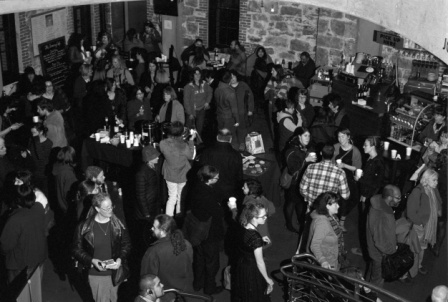Outside the Frame
Homeless youths are often misunderstood and misrepresented. They seem to be asking, “Who do you say that I am? Who am I?”
In January, 19 young filmmakers answered the questions at the second annual “Outside the Frame” film premiere held at Portland’s Gerding Theater.
Each filmmaker has experienced homelessness first hand. A capacity audience of 600, hosted by director Todd Haynes, viewed the young artists’ work.
Subject matter was broad. Themes included reasons for homelessness, domestic violence, the hypocrisy of class separation, PTSD and depression, managing chronic health conditions, the daily struggles of life on the street and the journey to enlightenment. Methods ranged from documentary and dramatic dialogue to poetry, farce and hip-hop. All videos can be found on the internet by using the search phrase “outside the frame in YouTube videos.”
“Outside the Frame” is a documentary showing that becoming homeless might happen because of pregnancy, job loss, illness, abuse or disagreements about faith. Homeless youth in the film said they often feel invisible. They have dreams for their lives, seek education and employment and try to contribute to society while facing obstacles.
“Flowers” is a haunting journey of domestic violence starting from verbal abuse, progressing to physical abuse and finally death. Denial, fear and regret are part of the story, tied together with the phrase, “He brought me flowers today.”
“Class Separation: The True Zombie Epidemic” is an entertaining farce with a broad sweep of characters. Through garbled dialogue with subtitles, viewers are shown that underneath masks and pretense, we are all human.
“Leon” is a poetic portrayal of the struggle with PTSD and depression. Viewers learn about loneliness, fear of rejection and a way out. The filmmaker seems to say it’s important to reach out to those in pain and spend time. “Together, we can fight. Together, we can stand up,” the film says.
“No Diabetic Police, Please” is a conversation about managing chronic health conditions and challenge stereotypes and assumptions about diabetes.
“The Miss Stephanie Show & Duahmers Big Day Out” is a humorous look at the daily struggles of homeless youths. They need to feel safe at night and learn they must quickly judge who to trust.
“I Need Light” is a faith-based music video about three people who cross paths on their journey to enlightenment. They’d landed in prostitution, drugs and gang violence, but discovered Christ and changed. The festival made those who watched understand that these filmmakers can’t just be defined as “homeless youths,” but are artists who happen to be homeless.
The option for the poor and vulnerable is a basic pillar of Catholic social teaching. Catholic parishes would be a good place for homeless youths to realize their potential. Catholics could make a difference by reminding elected officials of their responsibility help homeless youths who are part of the poor and vulnerable in society.
Four of the filmmakers in February visited Oregon state legislators to lobby for health care reform. What can you do in your state?
Peace,
John
Article originally appeared in Catholic Sentinel www.catholicsentinel.org on March 12, 2012

